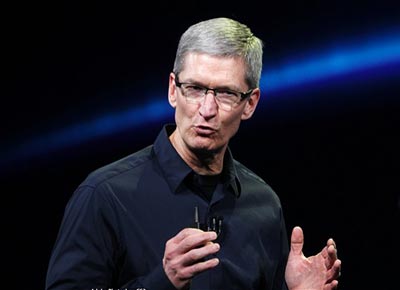 Washington:
Washington: Apple chief executive Tim Cook plans to propose a “dramatic simplification” of corporate tax laws when he testifies for the first time before Congress next week, just as lawmakers are considering an overhaul of the tax code.
In an interview with The Washington Post, Cook said he will present specific proposals aimed at encouraging companies to bring back foreign earnings to the United States and invest that money injob creation, as well as research and development. He will speak at a Senate hearing Tuesday that is taking aim at companies that shift profits overseas to lower their tax bills.
More than 1,000 U.S. companies hold an estimated $1.7 trillion in earnings overseas, according to a JPMorgan report. And Apple, which has built up one of the biggest cash piles in corporate history, holds massive amounts in foreign countries.
Some companies, especially large multinationals, have argued that US rates are too high and out of step with other developed economies.
“If you look at it today, to repatriate cash to the U.S., you need to pay 35 percent of that cash. And that is a very high number,” Cook said in an interview Thursday. “We are not proposing that it be zero. I know many of our peers believe that. But I don’t view that. But I think it has to be reasonable.”
But some tax analysts doubt whether merely lowering rates would work, given the sophisticated techniques companies employ to lower their tax bills.
Cook will appear before the Senate permanent subcommittee on investigations, which has grilled companies such as Microsoft and Hewlett-Packard on the ways they moved profits overseas to lower their tax bills. Cook, who will be the only corporate executive testifying at the hearing, is likely to face questions along these lines from the chairman, Sen. Carl M. Levin (D-Mich.).
Apple has $145 billion in cash, but analysts estimate it has only $45 billion available in the United States. The company surprised global investors last month when it launched one of the biggest corporate debt offerings in history to help fund payouts to shareholders. Analysts viewed that move as a tactic to borrow against its cash to pay dividends to investors and avoid U.S. taxes.
Cook, who declined to lay out his recommendations in detail, will make his first appearance at a congressional hearing since taking over as chief executive in 2011. Apple, one of the most valuable companies in the world by market value, does not have a large staff in Washington, nor does it often engage in policy matters.
The executive’s appearance before lawmakers signals a shift by the company to be more involved in inside-the-Beltway matters.
“Apple has a very strong moral compass, and we believe in really good corporate citizenship,” Cook said. “You can see this in the number of jobs we create in the US and how much we invest in the US”
As it has experienced massive growth, Apple has faced greater scrutiny of its business practices, especially the way it manufactures electronics in China. Recently, the company has been touting its contributions to the US economy.
Cook said Apple aims to create more jobs in the United States. When manufacturing begins later this year on a $100 million project for a line of Mac computers, components will be made in Arizona and the final assembly will take place in Texas.
The announcement earned Cook acknowledgment during Obama’s State of the Union speech early this year and a seat next to first lady Michelle Obama.
This year, Cook said, the company is on track to pay $7 billion in federal taxes.
“When you combine state and federal, Apple is paying approximately $1 million an hour in just domestic income taxes,” he said.
“You may not know this, but Apple likely is the largest corporate taxpayer in the U.S.,” Cook added.
Tech companies often have an easier time shifting profits across national borders because much of their assets are intellectual property, rather than equipment or factories. Apple was able to cut its federal bill by “billions of dollars” in 2011 through income shifting, according to calculations by Martin Sullivan, chief economist at the nonprofit group Tax Analysts.
 Washington: Apple chief executive Tim Cook plans to propose a “dramatic simplification” of corporate tax laws when he testifies for the first time before Congress next week, just as lawmakers are considering an overhaul of the tax code.
Washington: Apple chief executive Tim Cook plans to propose a “dramatic simplification” of corporate tax laws when he testifies for the first time before Congress next week, just as lawmakers are considering an overhaul of the tax code.